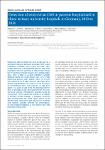Detection of enterovirus D68 in patients hospitalised in three tertiary university hospitals in Germany, 2013 to 2014
Böttcher, Sindy
Prifert, Christiane
Weißbrich, B.
Adams, O.
Aldabbagh, S.
Eis-Hübinger, A. M.
Diedrich, Sabine
Enterovirus D68 (EV-D68) has been recognised as a worldwide emerging pathogen associated with severe respiratory symptoms since 2009. We here report EV-D68 detection in hospitalised patients with acute respiratory infection admitted to three tertiary hospitals in Germany between January 2013 and December 2014. From a total of 14,838 respiratory samples obtained during the study period, 246 (1.7%) tested enterovirus-positive and, among these, 39 (15.9%) were identified as EV-D68. Infection was observed in children and teenagers (0–19 years; n=31), the majority (n=22) being under five years-old, as well as in adults > 50 years of age (n=8). No significant difference in prevalence was observed between the 2013 and 2014 seasons. Phylogenetic analyses based on viral protein 1 (VP1) sequences showed co-circulation of different EV-D68 lineages in Germany. Sequence data encompassing the entire capsid region of the genome were analysed to gain information on amino acid changes possibly relevant for immunogenicity and revealed mutations in two recently described pleconaril binding sites.
Dateien zu dieser Publikation
Keine Lizenzangabe

